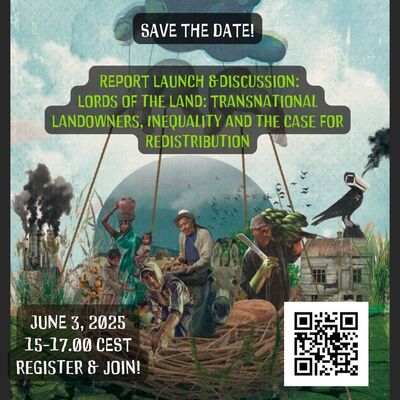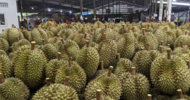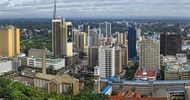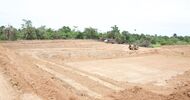A new rush for “carbon removals” and “offsets” from land, forests and oceans is ramping up repression under the guise of providing “nature based solutions” to the ecological crises.
As land becomes more expensive in the US, wealth becomes a deciding factor in who gets cut out versus who has the opportunities and the means to procure land.
For the past 13 years, 47-year-old farmer Saturday Wilson has been embroiled in a battle with a foreign oil palm plantation company over his farmland. It has placed him behind bars three times, but he still owns the land.
- FrontPageAfrica
-
15 February 2023
The project to cultivate 60,000 ha is "suspended" until the Malagasy state delivers on the investor's demand for preliminary development work to be done. TANY Collective offers an analysis.
- TANY Collective
-
15 October 2022
Protestors accused the Chinese company PT Julong Group Indonesia of taking over local land illegally for palm oil cultivation.
Oil palm plantations are expanding rapidly in Brazil, mainly in the Amazonian state of Pará. BBF (Brasil BioFuels), the largest oil palm company in Brazil, stands accused of environmental crimes and violence against indigenous, quilombola and peasant communities such as Virgílio Serrão Sacramento, a community linked to the Small Farmers’ Movement (MPA).
Brasil Bio Fuels, the largest oil palm company in Brazil, stands accused of environmental crimes and violence against indigenous, quilombola and peasant communities such as Virgílio Serrão Sacramento.
Did Indonesia just save a forest the size of Belgium? Or open the floodgates for its destruction? One giant, controversial palm plantation development, whose permits were among those cancelled, will be a crucial test.
The global land rush has highlighted deep-seated tensions between competing visions of agriculture, food systems, territory and society.
- Afronomics Law
-
17 November 2021
The rapid spread of oil palm plantations across Indonesia has spawned over 4,000 land conflicts, and the size of these plantations is doubling every decade. A new study, details the main causes of these conflicts and exposes the limited resources rural Indonesians have to seek resolution and redress for land loss.
The EU is trying to move soya production from Brazil to eastern Europe where big conglomerates are buying up fertile land in the country, depleting soils, planting illegal GMOs and polluting fresh water sources.
- Open Democracy
-
14 October 2021
China is one of the world's largest consumers of agricultural commodities such as soy and palm oil that drive deforestation globally. But it isn’t just Chinese consumption of these commodities that is helping fuel forest destruction. Global Witness new analysis sheds a spotlight on the often-overlooked role of Chinese banks as some of the biggest global financiers of deforestation.
- Global Witness
-
07 June 2021
For farmers in Asia as elsewhere, land ownership and effective control is the key to any radical transformation of the food systems and for attempts to achieve genuine sustainable development to really matter.
The violence inherent in the colonial plantation model does not spare systems of collective organization, food sovereignty, community care, cultural and language diversity, and ancestral knowledge.
An Associated Press investigation found poor conditions of millions of laborers from some of the poorest corners of Asia across palm oil plantation in Malaysia and Indonesia, many of them enduring various forms of exploitation, with the most serious abuses including child labor, outright slavery and allegations of rape.
As the world concentrates on dealing with COVID-19 pandemic, multinational companies continue to evict communities from their land, tearing down their lives and their sovereignty to plant monocrops like oil palm and sugar cane in Africa, or GMO soy in South America.
HighQuest Partners has documented an additional 100 ag investors that have made their first investment in food and agriculture in the first quarter of 2020, directly or via allocations to asset managers.
Open letter to the heads of the World Bank, the International Monetary Fund, and the European Bank for Reconstruction and Development
- farmlandgrab.org
-
06 December 2019
Agribusiness—especially soy, sugar, palm oil, and beef production—was the second deadliest sector for people standing up for the environment and their lands.
- Civil Eats
-
02 August 2019
The sustained advocacy by communities affected by large land deals and civil society for change to the policies and laws governing land administration have resulted in departures from the historical norms on land rights and tenure security.
- Front Page Africa
-
11 June 2019
In a strong show of support to rural communities asserting their right to land, 139 organizations from 26 countries across Asia Pacific, Africa, Latin America, North America and Europe issued a joint statement to mark the Day of the Landless last 29 March with several solidarity actions were also held on the same day.
The Australian Government's long-awaited foreign ownership of water entitlement register reveals one in 10 water entitlements is foreign-owned at 10.4 per cent.
ESCR-Net has written to President Bio about the human rights violations against members of the Malen Affected Landowners and Users Association in connection with industrial scale palm oil operations by Société Financière des caoutchoucs (Socfin Group).
The employees accuse CFC Stanbic of demanding more money than it lent to Karuturi, saying the South African lender is responsible for the poverty that struck their families since Karuturi was placed under receivership, 3 years ago.
- Kenyan WallSt
-
06 June 2018
In May 2016, awasMIFEE published a story titled “The Salim Group’s secret plantations in West Papua”, about four concessions owned by the Salim Group in West Papua. A year and a half later, Salim Group is still aggressively expanding, and threatening more areas of remote Papuan forest.
- AwasMIFEE
-
07 February 2018
In spite of a growing agricultural sector, attractive farmland prices and increasing foreign investment flowing into the sector, the decision to invest in Brazilian farmland is still very much a risk versus reward consideration.
Food security has become an essential goal for a country facing a land, sea and air boycott imposed in June by Saudi Arabia, the United Arab Emirates, Egypt and Bahrain
Since the 1990s, military juntas have been taking away the land of smallholders across the country, without any compensation and regardless of ethnicity or religious status.
While Canadian agriculture shows some promise, institutional investors have been active on the global front, particularly when it comes to farmland.
- Benefits Canada
-
11 April 2017
Large-scale agricultural projects are driving people off their land in Tanzania. An example is the case of the Maasai of Mabwegere, who are being dealt with harshly.
- Mondiaal Nieuws
-
08 December 2016
















